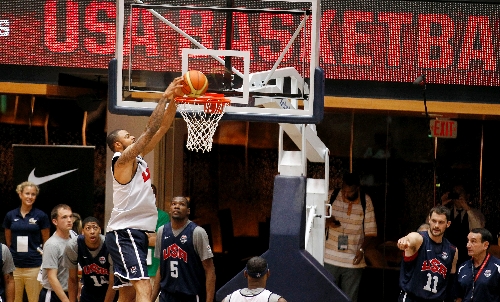U.S. weary of worries about lack of big men

WASHINGTON – Don’t call them Shorty.
The U.S. men are tired of hearing about their Olympic basketball team’s size problem. Instead of being called small, they would prefer to be known as versatile, quick, athletic, or something else that recognizes their strengths and not their, uh, shortcomings.
"Really it’s kind of boring to keep answering the question of what are you going to do with the bigs," U.S. coach Mike Krzyzewski said Sunday. "Like, this is who we have. Why don’t we talk about what we’re going to do with what we have, than talk about what we don’t have? I don’t really understand how that’s productive. So I’m trying to dismiss that and concentrate on what we’re doing."
The U.S. is down to just Tyson Chandler as the lone natural center on the roster. Dwight Howard is out after back surgery, and big man options such as Chris Bosh and Blake Griffin later joined him on the sidelines.
Yes, the Americans realize that could put them at a disadvantage against the likes of Spain or Brazil, who they will face today in an exhibition. But they’d also like to know what team is supposed to defend a front line of LeBron James, Kevin Durant and Carmelo Anthony?
"Look, maybe I’m wrong, but I don’t think so," USA Basketball chairman Jerry Colangelo said. "I’ll take versatility and athleticism and speed and quickness. That beats size all day long, because size alone can’t get it done."
If he was going to be wrong, it would seem to be against a team such as Brazil, which has loads of NBA size up front with Nene of the Washington Wizards, Cleveland’s Anderson Varejao and San Antonio’s Tiago Splitter on the roster. The Americans then travel to Europe and play tuneup games in Barcelona against Argentina and the Spaniards, who have NBA stars Pau and Marc Gasol, and Serge Ibaka along their front line.
Brazil came closest to beating a similarly sized U.S. team two years ago at the world basketball championship, losing by two points when Leandro Barbosa’s shot bounced off the rim at the buzzer.
"We wanted as good a competition as we could get during our pregames and with Brazil because of their front line and their experience and they’re a good team, Argentina and Spain, three out of the five are really good tests for us," Colangelo said. "So we’re very aware of what they have and it’ll be a challenge and we’ll learn a lot from that game, no question about it."
Colangelo thinks the days of the traditional low-post center are gone, largely because there are so few talented big men anymore, and calls the size debate "overused conversation, for sure."
Maybe he’s right, given what just happened at the end of the NBA season. The Miami Heat and Oklahoma City Thunder seemed intent on trying to go smaller than the other, the Heat hardly ever using a true center in their five-game victory in the Finals.
"That’s how it was," Durant said. "We were small in the Western Conference finals and in the Finals. Miami went small almost the whole (playoffs) with Chris Bosh being out, so it proves that you could play either way. Big, it’s tough to stop, but I think small-ball is tough to stop as well."
There are plenty of doubters, many of them big men themselves.
"If they make it a smashmouth game, I think they’ll have a hard time against a team like Spain," Atlanta Hawks center Al Horford said.
That was after Horford shot 1 of 12 for the Dominican Republic in the Americans’ 113-59 rout Thursday at the Thomas & Mack Center. The U.S. wings swarmed the Dominican guards with relentless pressure, making it tough to feed the ball inside to Horford in a spot he would want it.
Dominican coach John Calipari of Kentucky said afterward that the U.S. was big enough, agreeing with an opinion U.S. assistant Mike D’Antoni had when the Americans faced the same question four years ago: No team with James in the frontcourt is small.
Listed at 6 foot 8 inches and 250 pounds by the Americans, James has called himself an inch taller and 10 pounds heavier. Durant is 6-9, but with a wingspan that makes him seem 6-11. The 6-8 Anthony has played out of position as a power forward both internationally and in the NBA, and has no fear of pounding against bigger players.
At least one should have a huge quickness advantage over the man guarding him if an opponent tries to employ too many bigs. Kobe Bryant said the Americans would try to use opposing teams’ size against them.
And maybe they’ll prove this talk of being too small was really no big deal.












